

by Rachel Smith
13 October 2023
There’s been so much written and said about our first ever Content Byte Summit – and almost immediately after it was over I was thrown into a maelstrom of work, then a family holiday. We did do a small recap on the podcast with our favourite bits – but I also attempted (to the best of my ability) to live-tweet the whole event, so I really wanted to cherry-pick some of the Summit moments that have stayed with me and inspired me to change things up in my own business.
Let’s go!

Ed Gandia kicked off the conference with the first keynote on day 1 – and this one resonated with so many of us. If you want to earn more and become more indispensable to your clients, you need to be offering them paid advisory services / strategy. (Which many of us are probably doing for free anyway).

Great advice from Ed here.

It was fascinating to hear a host of different writers talking about what AI can’t do – like opinion writing. Kerri Sackville on the money!

Having the budget conversation early on is SO important – this came up a lot in the panel discussion between Lindy Alexander and Jennifer Goforth Gregory. Otherwise, you can waste so much time before finding out you’re really not on the same page. (Hot tip: you can also ask this question over email or in a client briefing form if you’re nervous about tackling it head on yourself.)

I found this so interesting – even with veteran writers, there’s often still so much fear around charging what you’re actually worth.
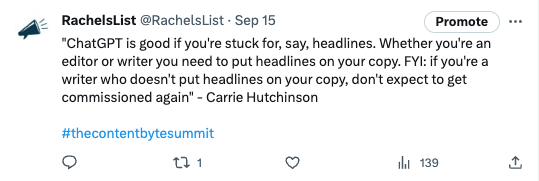
AI and how to use it came up a lot at the Summit but I found it interesting that several editors also brought up a little thing that really pisses them off – and that’s not finishing off your copy with a headline before you file. (I agree with you Carrie – it’s super lazy!) If you’ve written the piece, and you’re not taking a few extra minutes to think up a couple of headlines for it, editors will NOT be impressed. Jo Davy from Hardie Grant Media mentioned it too in her talk on storytelling:
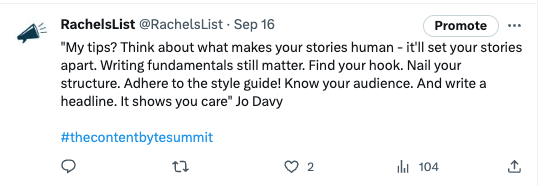
Hell yes, Jo.

I wanted to hear MORE from Cameron about interviewing. Such an important skill and one we can all get better at. Plus, AI has nothing on a journo with decent interviewing skills.

Fabulous insights from Ros Page about finding work through agencies. It comes up so much in the FB group – HOW to find the right agencies? It takes a bit of legwork and Ros shared some stellar tips on getting started. The great thing about having some agencies on your roster is it can easily add up to $2-3k work EVERY month, once they know and love your work. They just keep sending batches of briefs your way. Kaching.

Word rates are always a talking point in these parts. So interesting to see that journos like Jessica Mudditt accept nothing less than 70c word, but she regularly scores over $1.20.

Another great point from Jess about how, if an editor tries to pay you less (and yep, this goes on), you don’t have to say yes!

On a panel about finding work, Nigel Bartlett generously shared what you can make on government contracts. These can be great for short contracts and a regular income, plus of course, getting paid super.

There was a fair amount of discussion about how to build your brand and share your work online – and how doing so DOES bring new commissions and clients your way.

Back to AI – Susan Reoch did a blisteringly good presentation on how we can use it as writers to become more efficient.
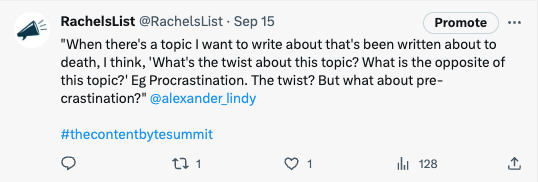
Lindy’s pitching presentation threw up so many nuggets of gold but I loved this one – how to find the twist on a topic to make it interesting / relevant to an editor who feels like they’ve seen it all before.

And, if you’re looking for corporate writing and hunting for potential clients on LinkedIn, seek out companies with 5000 employees and check out the kind of content they create to see if you’d be a good fit.

Jennifer Goforth Gregory stole the stage in her day 2 keynote speech. I was actually quite emotional listening to her talk about creating a business that works for you, rather than trying to adopt a cookie-cutter idea of a business that you’ve seen works for someone else. So insightful.
Loved her tips on walking away from clients who aren’t a good fit for you. She talked a lot about this, and about when she knows she wants to take on a client. (If you don’t already read Jennifer’s blog, it’s so worth it.)

JGG didn’t shy away from her weaknesses (she told a great story about how a client nearly fired her because of typos. She promptly hired a proofreader.)

To find your superpower, said Jennifer, can be tough – so a quick way is to ask colleagues around you what you’re really good at.
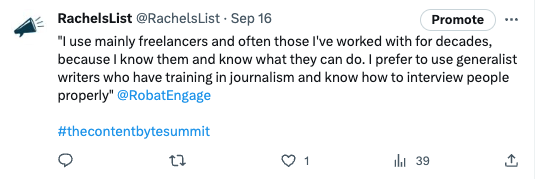
Our editors and content chiefs panel was amazing. Rob Johnson at Engage Media hires freelancers all the time and although we hear how important niches are, he actually prefers generalists (who know how to get great quotes from a person).

Rob’s definition of a good freelancer.

Vic Lea works at Six Black Pens – an agency that does a range of campaigns. She talked about how she looks for freelancers who can go on a journey with her and be adept at repurposing messaging for a variety of different platforms and formats.

And Claire Isaac, who works at Are Media, talked a lot about how, while they use AI for some things, it doesn’t produce the quality of writing editors are looking for. Human writers, unite!

Racquel Collard‘s super comprehensive talk on marketing was a big kick up the bum to anyone who neglects their marketing. Ahem.
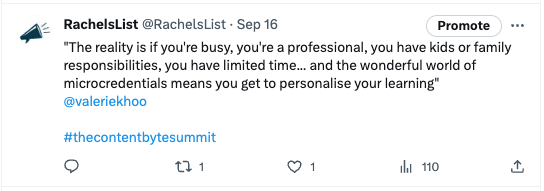
And Valerie Khoo touched on curiosity, following your passions, and how the world of microcredentials is enabling us to cherry-pick what we want to learn. SO GOOD.

Lots of great stuff from the Business of Freelancing panel – including this from Michelle Bowes, author of Money Queens, who nailed it on why we shouldn’t be scared of putting our rates up.

It had never really occurred to me to think of projects in this way until Jac Taylor brought it up on the Business of Freelancing panel.

Our last panel was on all the different income streams you can tap into as a freelancer. Loved Anna Featherstone‘s discussion points on chosing a book idea.
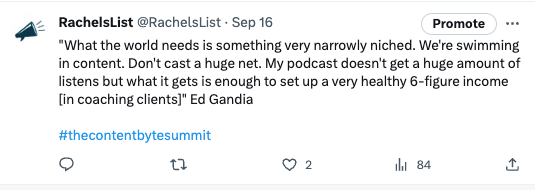
Ed also talked about nicheing down and serving a very specific audience which made a heap of sense to me.
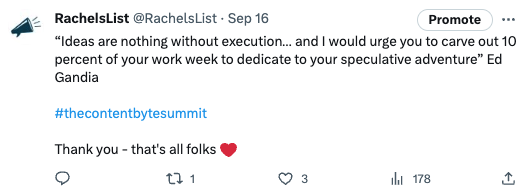
I’ll end here, on one of my favourite quotes from the whole conference – Ed Gandia talking ideas, and telling us to spend 10 percent of our work weeks pondering those ‘speculative adventures’. Is this something you want to carve out time for? I certainly do!
Thanks to all who came to the conference and to our fabulous speakers. This is just a tiny sliver of all the amazing knowledge that was shared. What were your favourite Summit moments? I’d love to hear from you in the comments.
Image credit: Francesco Solfrini